For a few months, I have been part of a short-story-reading group operating under the aegis of New York City’s 92nd Street Y. Each week we read and then, via Zoom, discuss a short story. A couple of weeks ago, a few days before the horrendous attacks on Israel by Hamas, I suggested we read Act of Faith, a 1946 story by Irwin Shaw, who has been one of my favorite authors. This short story was written soon after Shaw served in the United States Army in Europe during World War II. Act of Faith is one of so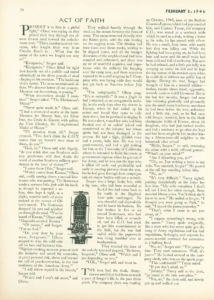 many of Shaw’s stories that appeared in The New Yorker magazine in the next two decades.
many of Shaw’s stories that appeared in The New Yorker magazine in the next two decades.
Irwin Shaw (originally Irwin Gilbert Shamforoff) was born in The South Bronx, New York, in 1913. His family moved to Brighton Beach, on have also attached a link to the story at the bottom of this email in case the google-drive version is difficult to open.
Brooklyn’s Coney Island, when he was seven years old. Both his parents, William (from Kiev) and Rose (born in America) Shamforoff were avid readers and William, particularly, imprinted on Irwin and his three-years-younger brother, David, a great love of literature. His parents were determined to become assimilated and had mixed feelings about the subject of religion. At one point, William and his two brothers, changed their last name to Shaw. Young Irwin, however, retained the name Shamforoff thoughout high school. In later years he would call himself a non-practicing Jew and at other times, an atheist. Yet a deep concern with anti-semitism would be obvious in some of his finest stories and also in The Young Lions, his great novel of World War II. He was writing stories beginning in late childhood. When, in 1929, he entered the then new Brooklyn College, in downtown Brooklyn years before the current campus was created, he enrolled under the more literary name Irwin Shaw. There he devoted himself to learning his craft, reading as much classic literature as he could. He also studied contemporary masters such as Thomas Wolfe, William Faulkner, F. Scott Fitzgerald and Ernest Hemingway, whose style of writing and style of life, Shaw tried to emulate. Shaw soon developed his own distinct voice as an author but, unfortunately followed Hemingway in some of the ways the older writer lived life.
At first, Shaw attended night classes and, when he enrolled full-time, he also joined the football team. The intellectuals on campus looked down on him while he was considered a great athlete by most. After two seasons, he resigned from the team to “devote more time to his studies.”
After graduation in 1934, Shaw found his first paying job with the pioneering radio producer Himan Brown, himself a recent Brooklyn College Graduate. Shaw wrote for Dick Tracy, The Gumps and Studio One. As the Great Depression deepened Shaw found himself being the provider for his family, showing a great generosity of spirit that would never leave him. The experience matured him and, before very long, he was a seasoned writer. These years are captured in one of his most highly regarded short stories, Main Currents of American Thought, published in 1939.
Shaw’s first novel, The Young Lions, was published in 1948. This is one of the great World War II novels, along with Normal Mailer’s The Naked and the Dead, James Jones’ From Here to Eternity and Herman Wouk’s The Caine Mutiny. The Young Lions 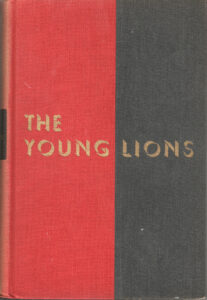 was a huge success and was eventually published in more than 50 languages.
was a huge success and was eventually published in more than 50 languages.
Shaw wrote many brilliant short stories, novels, plays and screenplays as well as works of non-fiction. His complex life defies summarization in this essay and Irwin Shaw – A Biography, published in 1989, is an excellent accounting of his story by Michael Shnayerson. For years, his reputation declined with withering critiques that often seem to be as directed against his unconventional life as against his writing. In recent years there have been highly favorable commentaries about Shaw, hailing him as an exceptional short story writer and a marvelous and highly readable novelist.
Act of Faith is a poignant story about three soldiers still in France shortly after Germany surrendered. They are close friends who served together in several difficult battles and they now have a pass to spend the weekend in Paris. Unfortunately, they are broke. Attached is a copy of the story as originally published. As an extra bonus, the cartoons are included. Some of them are ‘dated’ and not as immediately understood as they were in 1946. As example, the last cartoon showing a couple moving into a store front is a response to the severe housing shortage in the post-war years.
The story is masterfully written and repeatedly touching:
https://drive.google.com/file/d/1Gusc-DrUpssB5_QYl1IHUk50V9ZVUri0/view
But the real story is not about war-weary soldiers needing money to enjoy a much-needed vacation weekend in Paris. This is a story about anti-semitism in America and, although not implicit in the story, also about the possibility of acts of bigotry against Moslems, Blacks, Asians and others who are integral to the fabric of America.
Shaw was not a combatant in World War II. Still, he was one of the first, along with the great film Director George Stevens (A Place in the Sun, Giant, The Diary of Anne
Frank, Shane and many more), to enter the newly-liberated Paris in 1945. Act of Faith might be considered a fitting bookend for the blog sent a few days ago (https://stephenageller.com/2023/10/28/thoughts-on-seeing-a-rabbis-recent-sermon-about-the-recent-brutal-savagery-in-israel/ ). I hope they both promote thought, discussion and, if necessary, action against what seems to be growing numbers of people who claim to be American but have no idea what that means.
In recent weeks we’ve all been inundated with dreadful news. The horrific slaughters of October 7, the horrifying maiming and death of thousands of bystander people in Gaza and the senseless murder of a 6-year-old—6 years old!—Palestinian-American boy in Illinois. We’ve seen the wrenching photographs of hostage after hostage. Awful stuff.
You may also have seen the newspaper articles and television news reports about the great increase in gun sales, including to Jewish and Israeli Americans, men and women. There’s even a Jewish group dedicated to the preservation of gun rights. It was so startling to see the picture of a gun shop, owned by a Jewish man, crowded with Jewish women. It’s not difficult to find a similar image with “Proud Boys” and their ilk. I know there’s a difference but there are also too many similarities.
I’ve asked myself more than once what I would do in Act of Faith’s Seeger’s place? Would I sell the Luger pistol I got after battling with and killing an SS officer? Or would I keep it from my friends to protect myself and my family in case we needed it back in America? Tragically and sadly, those questions are as valid today as they were in 1946. What a terrible state we are in! And it’s not some booted foreign forces we need to fear. We are most threatened by the same people—ostensibly fellow citizens, theoretically Americans—who stormed the Capitol on January 6, 2020, a new date to live in infamy.
***************************
Two grim blogs in a row! Time for a change. Ice cream is on the way.
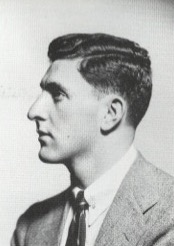
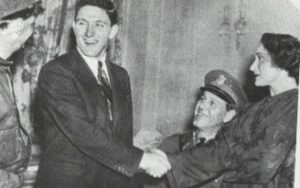
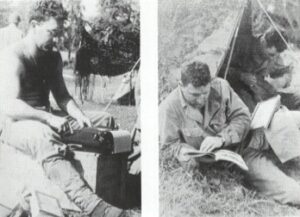
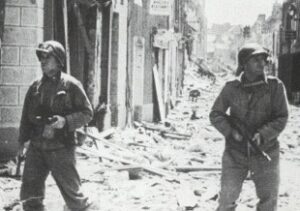
November 10, 2023 at 6:34 pm
Your last two superb blog submissions touching on antisemitism remind me of that old adage that the more things change, the more they stay the same.
Alas.